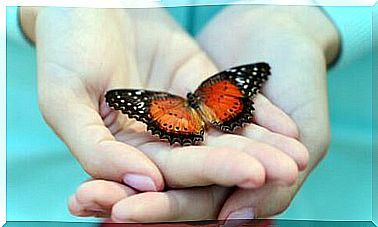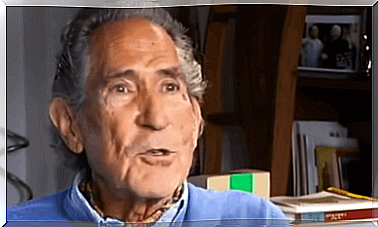5 Brands That Differentiate Healthy Love From Unhealthy Love

From the moment we are born, we create bonds. To love is perhaps the verb we conjugate the most on the journey of life. But who teaches us to love? What are the learning tools or resources that we benefit from? If this is so important, why isn’t there a subject in school that teaches us about healthy love?
The answer is simple: because we are not aware that loving correctly can be learned. It is a way of acting that we have assimilated. We think this way because we don’t have memories of times when we didn’t love anyone.
Our first word comes after the first hug. We start our academic life long after the moment we first missed someone. We are born being totally dependent: depending on the will of others or, to put it another way, on the love of others in order to survive.
Moreover, in addition to not taking into account the fact that healthy love can be learned, we do not question our way of manifesting it. We are thus good enough to see signs of unhealthy love in others, but in general we are not good at identifying them in our pattern of behavior.
This is largely due to the fact that, in our brain, to love involves protecting, caring for someone, worrying about the other, all positive verbs – representative, in principle, of a love. healthy – which are contrary to harming, hurting or mistreating.

Statistics tell us that we all engage in behaviors that hurt the people we love. Indeed, we sometimes try to break their will, by relying on very unethical manipulation strategies, without considering the other as an equal.
To put it another way, sometimes we love extremely badly. On the other hand, some people have learned systematic relationship patterns that are capable of hurting, to a great extent, the person on the other side of the attachment bond.
The differences between healthy and unhealthy love
Below are the main signs that indicate an unhealthy form of loving. We will take couples’ relationships as a reference, although these indicators can also be used for any relationship between two people who have an emotional bond.
Intensity
During the first stage of the couple relationship, the intensity tends to be very high. What can the other do? Does he feel good? How can I spend a little more time with him? As Katie Hood says, it ‘s not how a relationship begins, it’s more important, but rather how it continues.
As intense as this relationship is at the beginning, you can always begin to assess how you feel, if the other, in this willingness to be with you, also knows how to give you moments to breathe. Evaluate if his thirst for knowledge is meant to help you discover who you are or if, on the contrary, it is meant to control your movements.
Isolation doesn’t go hand in hand with healthy love
People who dislike healthily tend to try to push the other away from their loved ones early on instead of trying to fit in with this group. They judge harshly the possible errors of those around them and, instead of seeking reconciliation, they try to provoke a rupture.
They draw up their particular list of affronts and recite it frequently to the other, seeking to trigger the confrontation and, consequently, to lead to a distancing. “I told you that your brother was a selfish”, “I told you that your friend only wanted to take advantage of you”, “you yourself told me that two years ago you went through a bad time and she didn’t call you much ”.
This type of behavior is very common in people who want to occupy all of each other’s space. However, these are also ways of speaking that we have all used before.
This is why it is important to take into account that we can all love better, that we all behave, at some point, in a selfish way with each other. This type of behavior often happens instinctively.
The need for control
In general, the more control we have over those around us, the better we feel. Seeing that our behavior has a direct or indirect influence on the behavior of others is a real reinforcement.
The problem begins with this confusion: to see the other as an extension of oneself. We thus think we occupy a position superior to that of the other, like the general who gives orders to his army from the control tower. “You must do what I tell you”, “You are always wrong, you better listen to me”.
Extreme jealousy
Jealousy arises from a misconception: thinking that someone belongs to us. To get back what we think we are losing, we may end up saying phrases like “you don’t love me like you used to”. Extreme jealousy, being very far from the concept of healthy love, manifests itself in particular by mistrust.
“- Why did you take so long?
– The meeting I had at the end of the morning lasted longer than expected.
– Yes that’s it… “
This “that’s it” is a hidden “I don’t believe you”. This is a bit of a treacherous way of saying “I didn’t appreciate your being late”. In other words, the day you are late again, you better have a good reason.
Contempt
“Why are you trying so hard? You and I know very well that you are not going to make it ”. We’ve all had the feeling, along with someone we love, to see them set a goal that is beyond their reach. We have all been tempted to spare him this suffering.
However, as we have seen, to love well, we sometimes have to negotiate our own temptations, those that we would listen to impulsively. In addition, it often happens that we do not take this point into consideration: people benefit from resources that we do not know.
To love in a healthy way also means to allow the other to learn, to give value to their capacities. It is to try to build and not to destroy.
For example, we can reduce our working hours to allow the other party to have an extra evening to prepare for his competition, sacrifice three consecutive evenings of free time after dinner to help him prepare for his interview, or even analyze his CV and give it a hand to improve it.
There is a much more subtle form of contempt: treating the other as if they are crazy, accusing them of being too sensitive after making a very hurtful comment. Or forget what intimacy is and criticize the other in front of other people, with actions or words that should be confidential.

Healthy love involves putting yourself in the other’s shoes
To love in a healthy way, to love better, begins by putting yourself in the other’s shoes. We must get to know him before judging him, and recognize that our vision will surely be much more partial than his when it comes to making decisions.
Loving well involves understanding that we can love better, that this is a ground on which we can always learn. It also involves combining honesty by removing or keeping for ourselves that part that we might consider sincerity, but which does not add much.
Loving well means allowing others to help us, taking their efforts into account and raising their self-esteem. It is to avoid placing him in a position of vulnerability in order to have more control over his life.
In addition, others will sometimes like us badly. In these cases, we have the opportunity to tell them: “Daddy, grandfather, my brother, I know you love me but you are not doing it well”. A lot of ways of loving can just change with this phrase, inviting the other to think.
When it comes to the acceptance that is incumbent upon us, there will be times when we need to distance ourselves from people who love us, but not healthily. The importance of having to distance ourselves, for our own good, from people who really love us but who hurt us at the same time is also not explained in the school books.










